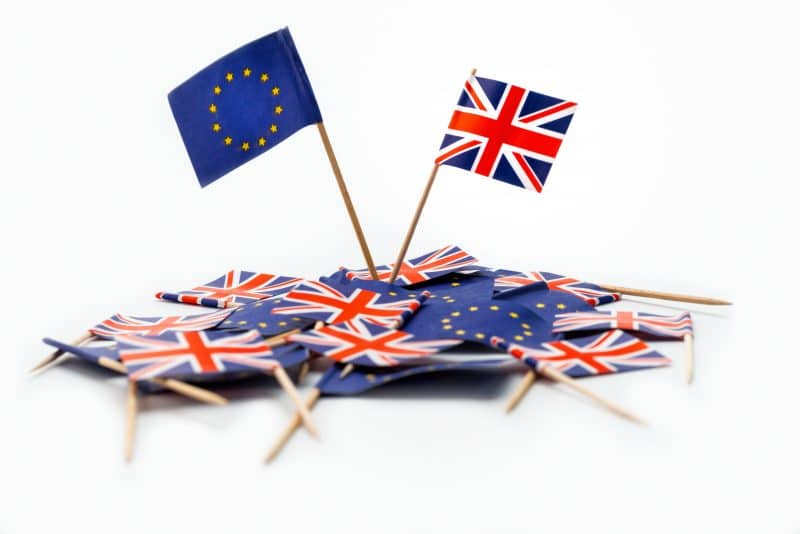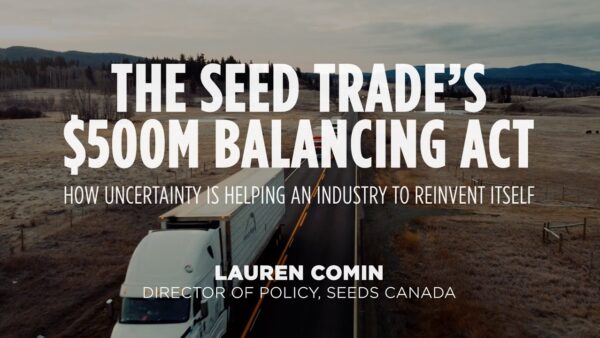The seed sector, along with all other sectors of the European economy, will be impacted in many ways by Brexit, should it proceed as planned. At this uncertain point in time, those in the seed industry have worked hard to determine the possible impacts of Brexit and made preparations of various degrees – keeping in mind that the impacts will depend on the terms of a deal, if any, and that a free trade agreement may minimize the impacts significantly.
At this point, it’s much too difficult, and indeed quite pointless, for the BritishSociety of Plant Breeders (BSPB) to comment. “Every day,” notes CEO Penny Maplestone, “things just seem to get more uncertain, not less.”
However, a significant concern, which spans the entire European seed industry, can be pinpointed at this time. It is the requirement for registration of varieties to be exported to the UK from the EU, and vice versa.
Kristiaan Van Laecke, secretary-general of Semzabel in Belgium, notes that because varieties bred in the EU will have to be approved a second time by the UK before import, UK breeders and farmers will have fewer choices. “In cereals, a lot of varieties sown in Belgium are breeding results of breeding in the UK,” he explains. “A no-deal scenario might be a big problem in particular for maize seed and rapeseed, especially maize, as there’s no breeding or seed production of that crop in the UK.”
[tweetshare tweet=”As a result of Brexit, UK breeders and farmers will have fewer choices.” username=”EuropeanSeed”]
Seed imports are a necessity for many crops grown in the UK, agrees Nigel Moore, head of business administration for KWS Cereals business unit. He believes that whilst UK government has promised to unilaterally recognise EU certified seed of UK registered varieties as marketable, movement of seed from UK to EU requiring OECD and OIC certification and labelling will be a significant administrative burden on companies like his and for UK officials. He is also concerned that even this, export only becomes possible if an equivalence agreement can be reached.
Mari Raininko, secretary-general of the Finnish Seed Trade Association, adds that costs for some Finnish vegetable seeds may increase for UK farmers due to export issues, and that the number of vegetable varieties available to them may also drop. Nils Elmegaard, secretary-general of the Danish Seed Council, also reports that a similar reduction in Danish options may befall UK seed producers if access to the UK market becomes more difficult. In addition, there may be problems with seed testing quality, adds Karol Duczmal, honorary president at the Polish Seed Association.
Looking in the other direction, and specifically at Estonia, Karen Rätsep, manager of the Estonian Seed Association, explains that “many UK varieties are suitable for growing here, such as many pulses, and also barley and wheat. But if the price of using them increases considerably due to new taxes and so on, we will look elsewhere.”
Van Laecke says Semzabel’s members in Belgium have been informed that some of their EU varieties will likely no longer be able to be marketed in the UK and vice versa. He and his team have also asked the Belgium government to put a simple and cheap system in place so that UK varieties which were commercialized in the past in Belgium can continue to be available to Belgium farmers. “At the same time,” he says, “we have encouraged our members to do the opposite for those varieties which are not presently commercialized in the UK.”
Per Henriksson, secretary-general of theSwedish Seed Trade Association, reports that approval of varieties in the common catalogue has been achieved for the UK and Sweden, for the majority of crops/varieties that ‘flow’ in both directions. “For one crop however, the question mark remains: UK (Scottish) bred-potato varieties,” he says. “In addition, if/when the UK is considered a ‘third county,’ other issues will emerge, not least related to phyto-regulations and movement of plant material across the EU border.”
Moore confirms that his company has been making preparations for the prospect of a third-country border with the EU for some time with regard to plant variety protection, variety registration and maintenance. “This has necessitated obtaining parallel registrations and preparing for UK national PVP in parallel to EU PVP following Brexit,” he reports. “Of course, these measures add considerable cost and administrative burden on both sides of the border.”
Marian Suelmann, company lawyer at seed firm Rijk Zwaan, notes that because her company operates internationally, it deals with third countries every day, and therefore if the UK becomes a third country, it will not create unsurmountable problems. “In general, it seems clear that import and export of seed, plant material and produce gets more complicated and this might have consequences for where companies will produce” she adds.
[tweetshare tweet=”Post-Brexit, import and export of seed, plant material and produce gets more complicated and this might have consequences for where companies will produce.” username=”EuropeanSeed”]
In terms of other Brexit preparations, two years ago Rijk Zwaan started to apply for double PBR protection, both at UK level as at EU level. In addition, “we reported varieties that are on the EU Common Catalogue and that are also being sold in the UK to the UK authorities for inclusion in the UK national list,” says Suelmann. “Furthermore, stocks have been increased at our UK subsidiary to overcome problems at the customs level.”
For its part, Plantum of the Netherlands has prepared for Brexit by conducting training courses (for members who are new to exports outside the EU) on dealing with phyto and customs rules and has also urged certification agencies to hire additional inspectors. Plantum Managing Director Niels Louwaars adds that he and the Dutch authorities have created solutions for acute variety registration issues and made sure that breeder’s rights were on the early agenda of negotiators.
[tweetshare tweet=”National seed associations in the EU have created solutions for acute variety registration issues post-Brexit.” username=”EuropeanSeed”]
In Ukraine, because its economic integration to the EU is still occurring, aseparate bilateral agreement with the UK will be needed if Brexit occurs. Seed Association of Ukraine Executive Director Siuzana Grygorenko notes that UK farmers may be interested in seeds of cereal crops (wheat, barley and oats) either bred in Ukraine or produced there by foreign companies such as German or France-based firms.
Van Laecke lists another couple of possible problems resulting from Brexit, one being volatility between the pound sterling and the Euro, and the other, future authorization of seed treatments in the UK which are not allowed in Europe. Grygorenko notes another possible Brexit issue to be long-term access to plant protection products. “The UK has had a leading role,” she notes, “in the related regulatory work.”
[tweetshare tweet=”Among the Brexit problems are volatility of the currency, authorization of seed treatments and long-term access to plant protection products.” username=”EuropeanSeed”]
In terms of crop markets in the UK, Moore believes many factors come into consideration after Brexit that can influence crop production for both domestic and export demand for example, trading relationships with the USA, the EU, and possible WTO tariffs. He points out that demand for domestic meat/milk and grains for feed are all influenced by global trading economics, trade deals and whatever form the UK agriculture policy will take if it diverges from CAP.
“Today, these influences are impossible to predict,” he says. “This uncertainty is also reflected in commodity markets and futures prices which seem not to take any indicative position. In general, we know that UK agriculture is at a high level of professionalization with high productivity but for global competitiveness to be maintained in the context of environmentally-responsible farming, adjustments to government support and underlying asset values such as land are likely. So, we can expect UK arable land to remain in productive agriculture, albeit with an adapted economic framework. We can then also assume that demand for high-performing varieties and breeding innovation remain key elements of UK agricultural future.”
Breeding innovation post-Brexit, in the EU and the UK
Whether leadership in the UK will maintain the country’s current regulatory alignment for GMOs and NBTs with the EU after Brexit, or choose to forge its own new regulatory path, remains to be seen. Duczmal is hopeful that theUK will align with the EU, finding ways to use NBTs effectively but not using GMOs.
If the UK does start using GMOs, Elmegaard believes that in theory the country might gain advantages over EU countries, but that it also will certainly have to deal with trade barriers with the EU.
Regarding the Netherlands specifically, Louwaars observes that if the UK becomes very liberal in approving GMOs for cultivation, the cultivation of field crops there might increase. This in turn might negatively affect exports of Netherlands’ potato (and with time, turf) seed to the UK.
[tweetshare tweet=”UK policy divergence on GMOs is more likely in the event of a hard Brexit scenario.” username=”EuropeanSeed”]
For his part, Moore believes that UK policy divergence on GMOs is more likely in the event of a hard Brexit scenario, and might also be favoured if the US government makes overtures relating to agricultural trade issues. “This can of course lead to additional requirements for export of GMO feed to the EU in the same way as other third countries, which would need to be considered,” he explains. “However, commodity GMO crops for feed production (for example, grain maize and soybeans) are not cultivated in the UK due to the climate, and therefore whilst the regulatory regime might be more receptive to innovation, opportunities for large scale GMO production in UK are rather limited.”
Moore adds that crops such as wheat for example, are a long way away from widespread GMO cultivation due to being a globally traded human consumption commodity and therefore up-front R&D investment economically generating returns from domestic UK markets alone is hard to imagine outside of especially high value applications.
“To achieve a level playing field worldwide we aim for harmonisation on many issues. Therefore, we hope also hope for as much as possible alignment between UK and EU legislation” says Suelmann.
Van Laecke, Henriksson and Elmegaard have another concern relating to the UK possibly allowing the creation of GMOs and differing use of NBTs compared to the EU following Brexit. They are concerned that would result in EU seed company research labs being moved to the UK. If such an eventuality occurs, Elmegaard warns that “the European breeding community, farmers and consumers/society will all be left behind.”











